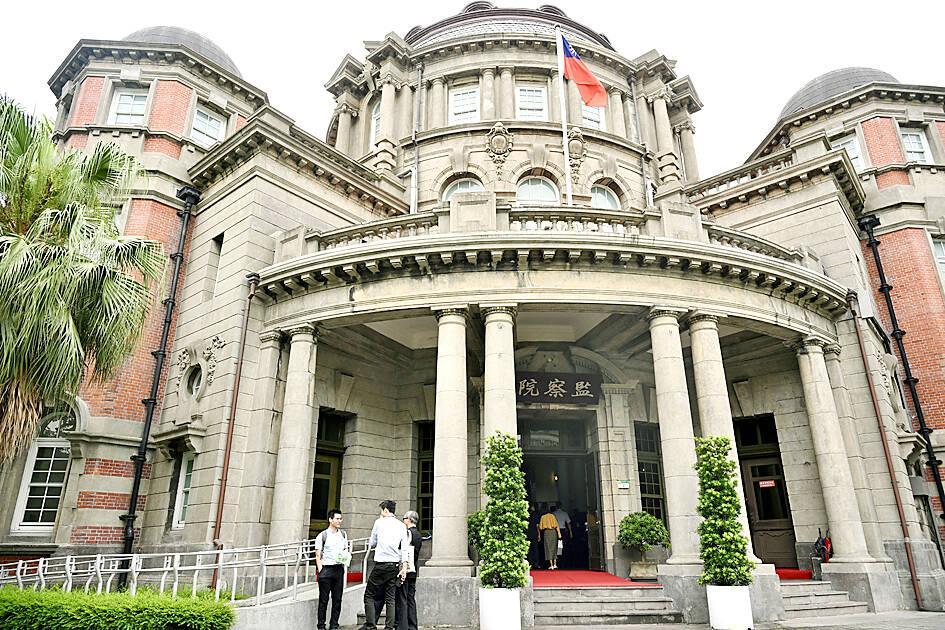A majority of the justices on the Constitutional Court have voted to accept the Control Yuan’s petition for a constitutional judgement on this year’s central government budget, the Judicial Yuan said today.
The Control Yuan said its total allocated budget was NT$1.09 billion (US$36.56 million), of which more than NT$800 million was for personnel expenses, but its budget for operation expenses was reduced from NT$240 million to NT$10 million, a 96-percent cut.
The Control Yuan filed the petition after it was forced to adjust or suspend several of its functions.

Photo: Lo Pei-de, Taipei Times
The budget was promulgated by the president on March 21, after opposition lawmakers from the Chinese Nationalist Party (KMT) and the Taiwan People’s Party (TPP) rejected two reconsideration proposals from the Executive Yuan.
The 96-percent cut to the Control Yuan’s operational expenses go beyond what is reasonable and “severely endanger” its ability to carry out its duties, the Control Yuan said.
The budget cuts functionally abolish the Control Yuan and undermine the principle of separation of powers, it said.
Yang Chang-hsien (楊昌憲), director of the Control Yuan's Department of Supervisory Investigation, filed a petition for a constitutional interpretation on March 24, asking the court to review the Legislative Yuan’s actions and invalidate the cuts retroactively to Jan. 1 of this year.
Per Article 32 of the Constitutional Court Procedure Act (憲法訴訟法), the court accepted the petition, the Judicial Yuan said today.
In other news, the Executive Yuan’s decision to reduce subsidies for local governments by 25 percent, NT$63.6 billion, continues to be debated.
Local government support for the Executive Yuan’s NT$63.6-billion supplementary budget could be a solution, Premier Cho Jung-tai (卓榮泰) said today.
Executive Yuan spokesperson Michelle Lee (李慧芝) quoted Cho as saying that the Legislative Yuan’s NT$207.6-billion budget cut directly impacts people and forced the Executive Yuan to adjust its expenditures.
KMT New Taipei City caucus secretary-general Wang Wei-yuan (王威元) and deputy secretary Huang Hsin-hua (黃心華) held a news conference today to protest the Executive Yuan’s decision, calling on the government to not use vulnerable groups as political bargaining chips.
They cited Article 30 of the Act Governing the Allocation of Government Revenues and Expenditures (財政收支劃分法), which says that the amount provided to local governments shall not be less than the budgeted amount from the year before.
Taipei Mayor Chiang Wan-an (蔣萬安) today said he would formally submit a request for the government to reconsider the decision as the subsidies have already been approved for use for social welfare initiatives.
Additional reporting by Huang Tzu-yang

The manufacture of the remaining 28 M1A2T Abrams tanks Taiwan purchased from the US has recently been completed, and they are expected to be delivered within the next one to two months, a source said yesterday. The Ministry of National Defense is arranging cargo ships to transport the tanks to Taiwan as soon as possible, said the source, who is familiar with the matter. The estimated arrival time ranges from late this month to early next month, the source said. The 28 Abrams tanks make up the third and final batch of a total of 108 tanks, valued at about NT$40.5 billion

Two Taiwanese prosecutors were questioned by Chinese security personnel at their hotel during a trip to China’s Henan Province this month, the Mainland Affairs Council (MAC) said yesterday. The officers had personal information on the prosecutors, including “when they were assigned to their posts, their work locations and job titles,” MAC Deputy Minister and spokesman Liang Wen-chieh (梁文傑) said. On top of asking about their agencies and positions, the officers also questioned the prosecutors about the Cross-Strait Joint Crime-Fighting and Judicial Mutual Assistance Agreement, a pact that serves as the framework for Taiwan-China cooperation on combating crime and providing judicial assistance, Liang

A group from the Taiwanese Designers in Australia association yesterday represented Taiwan at the Midsumma Pride March in Melbourne. The march, held in the St. Kilda suburb, is the city’s largest LGBTQIA+ parade and the flagship event of the annual Midsumma Festival. It attracted more than 45,000 spectators who supported the 400 groups and 10,000 marchers that participated this year, the association said. Taiwanese Designers said they organized a team to march for Taiwan this year, joining politicians, government agencies, professionals and community organizations in showing support for LGBTQIA+ people and diverse communities. As the first country in Asia to legalize same-sex

MOTIVES QUESTIONED The PLA considers Xi’s policies toward Taiwan to be driven by personal considerations rather than military assessment, the Epoch Times reports Chinese President Xi Jinping’s (習近平) latest purge of the Chinese People’s Liberation Army (PLA) leadership might have been prompted by the military’s opposition to plans of invading Taiwan, the Epoch Times said. The Chinese military opposes waging war against Taiwan by a large consensus, putting it at odds with Xi’s vision, the Falun Gong-affiliated daily said in a report on Thursday, citing anonymous sources with insight into the PLA’s inner workings. The opposition is not the opinion of a few generals, but a widely shared view among the PLA cadre, the Epoch Times cited them as saying. “Chinese forces know full well that